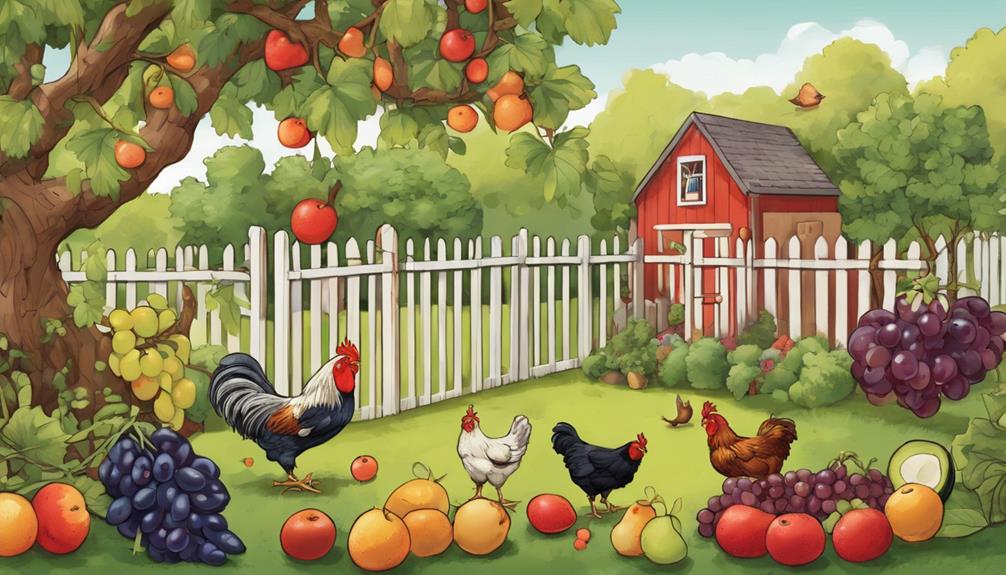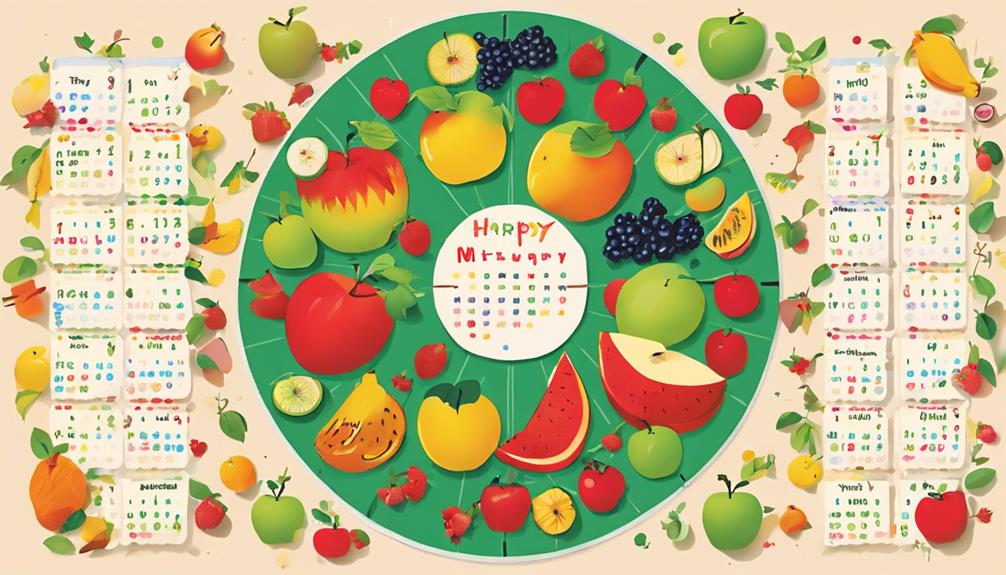In the world of backyard chicken keeping, navigating the safe fruits for your feathered friends can be akin to walking through a minefield blindfolded. You've likely heard that fruits like apples and blueberries are a hit, offering both nutrition and variety.
Yet, lurking in the shadows are the toxic avocados and cherry pits, posing potential dangers. It's a balance between ensuring your chickens are happy and healthy without accidentally compromising their well-being.
So, how do you make the right choices? Stick around as we uncover the safe from the unsafe, ensuring your backyard flock thrives on a diet that's both delicious and nutritious.
Key Takeaways
- Pineapples, honeydew, blueberries, strawberries, grapes, apples, and banana peels are safe for chickens.
- Avoid avocados, star fruit, peach pits, cherry pits, and apple seeds as they are toxic.
- Treats, including safe fruits, should not exceed 10% of the chickens' daily diet.
- Seasonal fruits like lettuce, tomatoes, carrots, and cabbage provide varied nutrition and immune support.
Essential Feeding Guidelines
To ensure your backyard chickens stay healthy and productive, it's crucial to follow essential feeding guidelines that cater to their specific nutritional needs. Chickens love a variety of foods, but their diet should primarily consist of a complete feed, which supplies them with the 38 unique nutrients they need. This type of feed should make up about 90% of their diet to ensure they're getting a balanced diet necessary for optimal health and egg production.
Feeding chickens the right amount is also essential. Laying hens typically need about 0.25 pounds of complete feed daily. While treats for chickens can add variety and enjoyment, they should be introduced only after your chickens start laying eggs and given in moderation. Excessive treats can disrupt their balanced diet, impacting their egg production negatively.
Safe Fruit List
Introducing safe fruits like pineapples, honeydew, and blueberries to your chickens' diet can add enjoyable variety without compromising their health. You're not just limited to these options; strawberries, grapes, and apples also make the list of safe fruits for your backyard flock. What's fantastic is that even banana peels, often discarded, can be a safe and low-sugar treat option for your chickens.
It's essential to educate yourself on which fruits are safe and which are toxic to avoid any health issues. While many fruits offer vitamins and hydration, being mindful of their sugar content and ensuring a balanced diet is key. You'll want to steer clear of high sugar or high salt options that could harm your chickens over time.
Toxic Fruits to Avoid

While you're mixing up your chickens' diet with safe fruits, it's crucial to steer clear of certain ones that can pose serious health risks. Educating yourself on fruits that are toxic to chickens is essential to ensure their health and safety. Here are the key toxic fruits you'll want to avoid:
- Avocado: This fruit, while healthy for humans, can be deadly for chickens, especially the pits and skins. The substance found in avocados is highly toxic to chickens and can cause serious health issues if ingested.
- Star Fruit: Despite its popularity and health benefits for humans, star fruit can be harmful to chickens. It contains substances that chickens can't process effectively, leading to potential health problems.
- Fruits with Cyanide: This includes pits from fruits like peaches and cherries, as well as apple seeds. These contain cyanide, a compound that's highly toxic to chickens even in small quantities. Avoid feeding these to your feathered friends to keep them safe.
Portion Control Tips
After learning about fruits to avoid, it's also key to understand how much and how often to safely feed your chickens their favorite treats. While it's delightful to watch your chickens eat treats with enthusiasm, remember these should be fed in moderation, not exceeding 10% of their diet. This ensures they don't neglect their complete feed, which is essential for balanced nutrition and optimal egg production.
Proper portion control is crucial. Overindulgence can lead to a decrease in egg production and disrupt the overall health of your flock. Here's a quick guide to help balance treats with complete feed:
| Treats vs. Complete Feed | Recommendation |
|---|---|
| Treats | No more than 10% of daily intake |
| Complete Feed | At least 90% of daily intake |
| Water | Always available |
Monitoring treat intake while ensuring access to complete feed and water is key to maintaining a balanced diet. This balance supports the health, well-being, and productivity of backyard chickens, ensuring they continue to thrive and produce eggs consistently. Remember, a little goes a long way when it comes to feeding your chickens treats.
Seasonal Fruits Guide

Feeding your backyard chickens seasonal fruits can significantly boost their health by providing a diverse range of nutrients all year round. Integrating these into your chicken feed not only enhances their diet but also supports their overall well-being. Here's how you can enrich their meals with seasonal fruits:
- Spring Offerings: Include lettuce, nasturtium, and asparagus in their diet for essential nutrients and immune-boosting properties. These spring fruits ensure your chickens are well-nourished after the colder months.
- Summer Selections: Tomatoes, bell peppers, and melons are perfect for the warmer months. They're rich in Vitamin C and antioxidants, providing the energy and support your chickens need to stay active and healthy during summer.
- Fall and Winter Choices: During fall, introduce carrots, squash, and sunflower seeds for their anti-carcinogenic and natural deworming benefits which also aid in egg production. In winter, switch to cabbage, broccoli, and pumpkins to continue supplying essential nutrients, disinfectant, and deworming benefits even in the colder seasons.
Incorporating these seasonal fruits into your chickens' diet ensures they receive a variety of essential nutrients, antioxidants, and immune-boosting properties throughout the year, promoting optimal health and productivity.
Conclusion
So, when it comes to feeding your backyard chickens, you've got plenty of safe fruit options. Remember to stick to fruits like pineapples, honeydew, and apples, but always steer clear of avocados and similar toxic ones.
Moderation's key—too many treats can mess with their laying. By keeping an eye on portions and opting for seasonal varieties, you'll ensure your chickens stay healthy and productive.
It's all about balance and knowing what's best for your feathered friends.